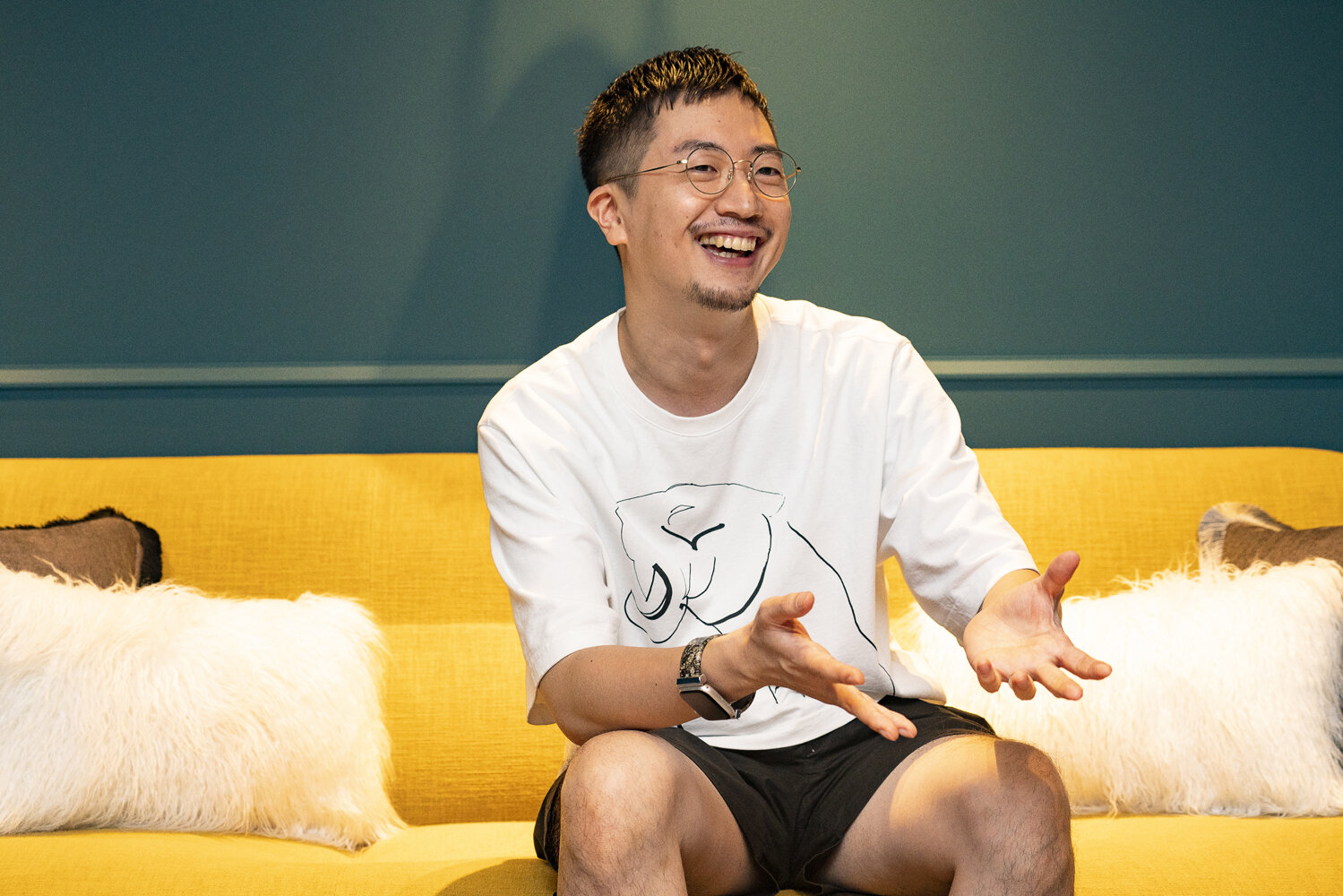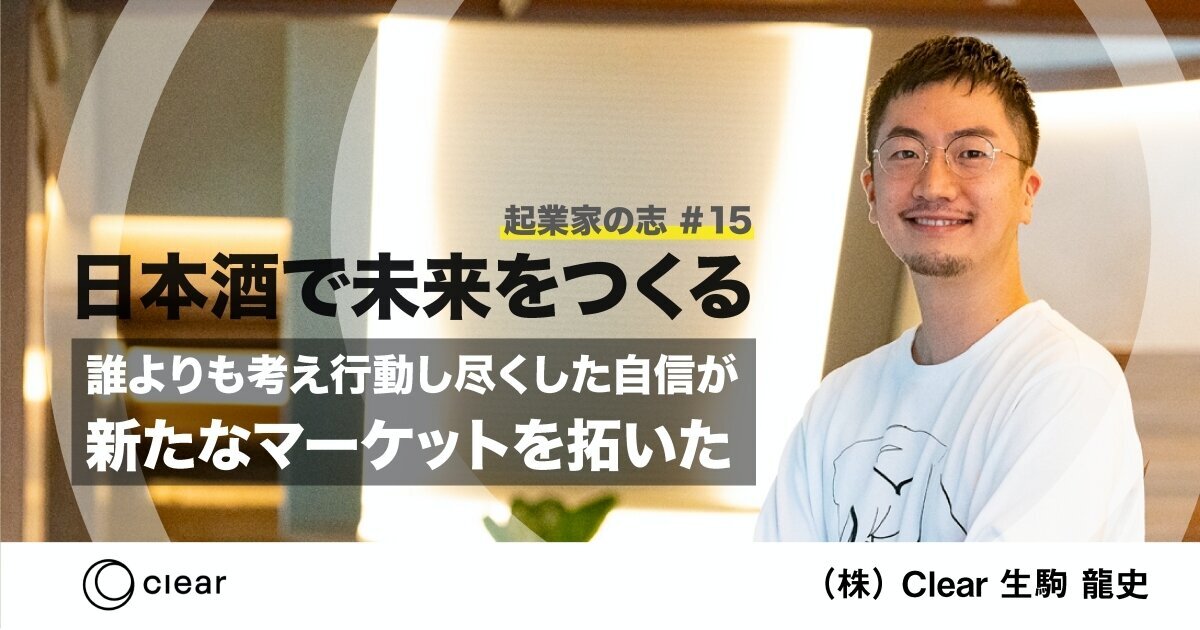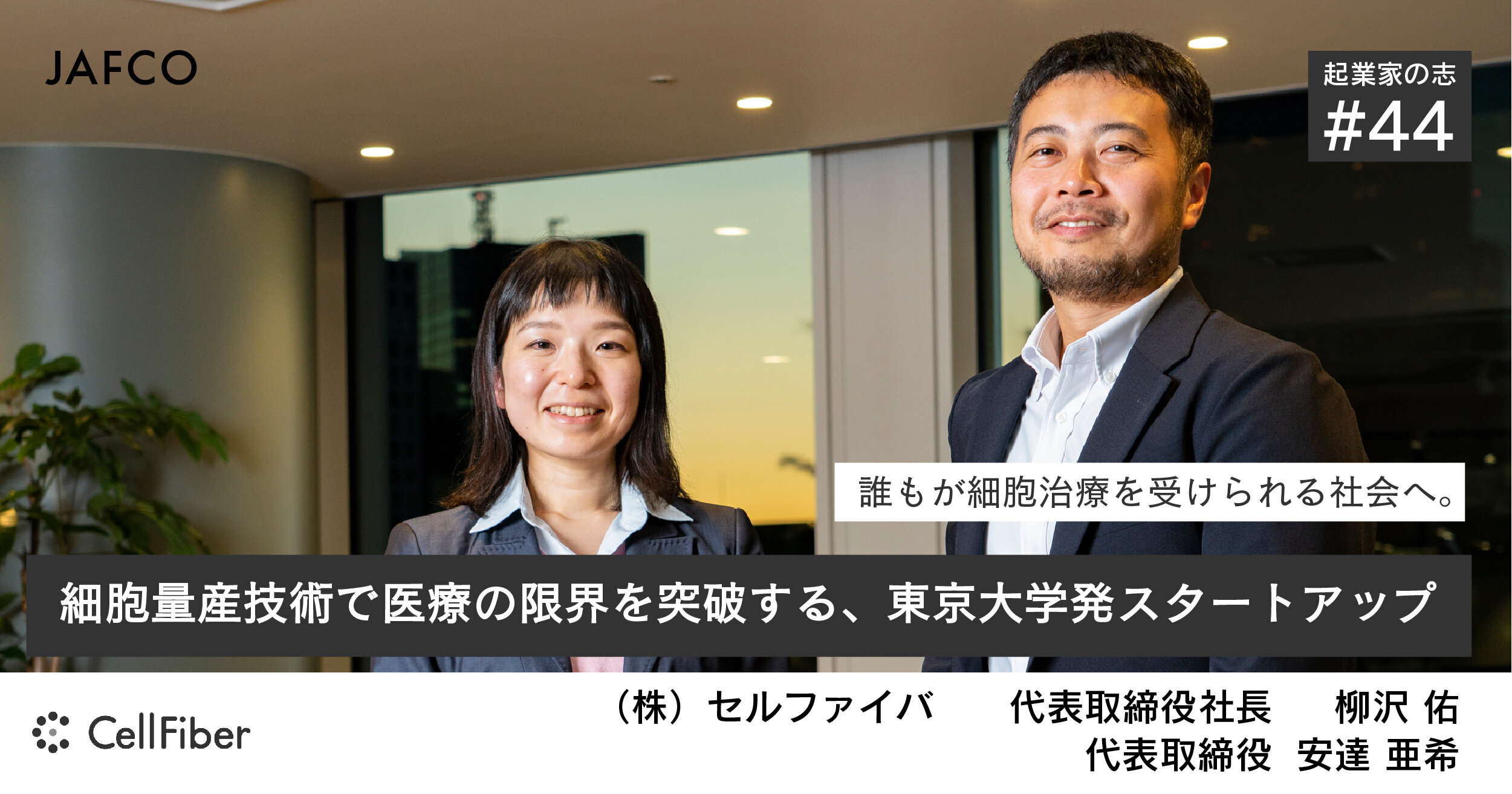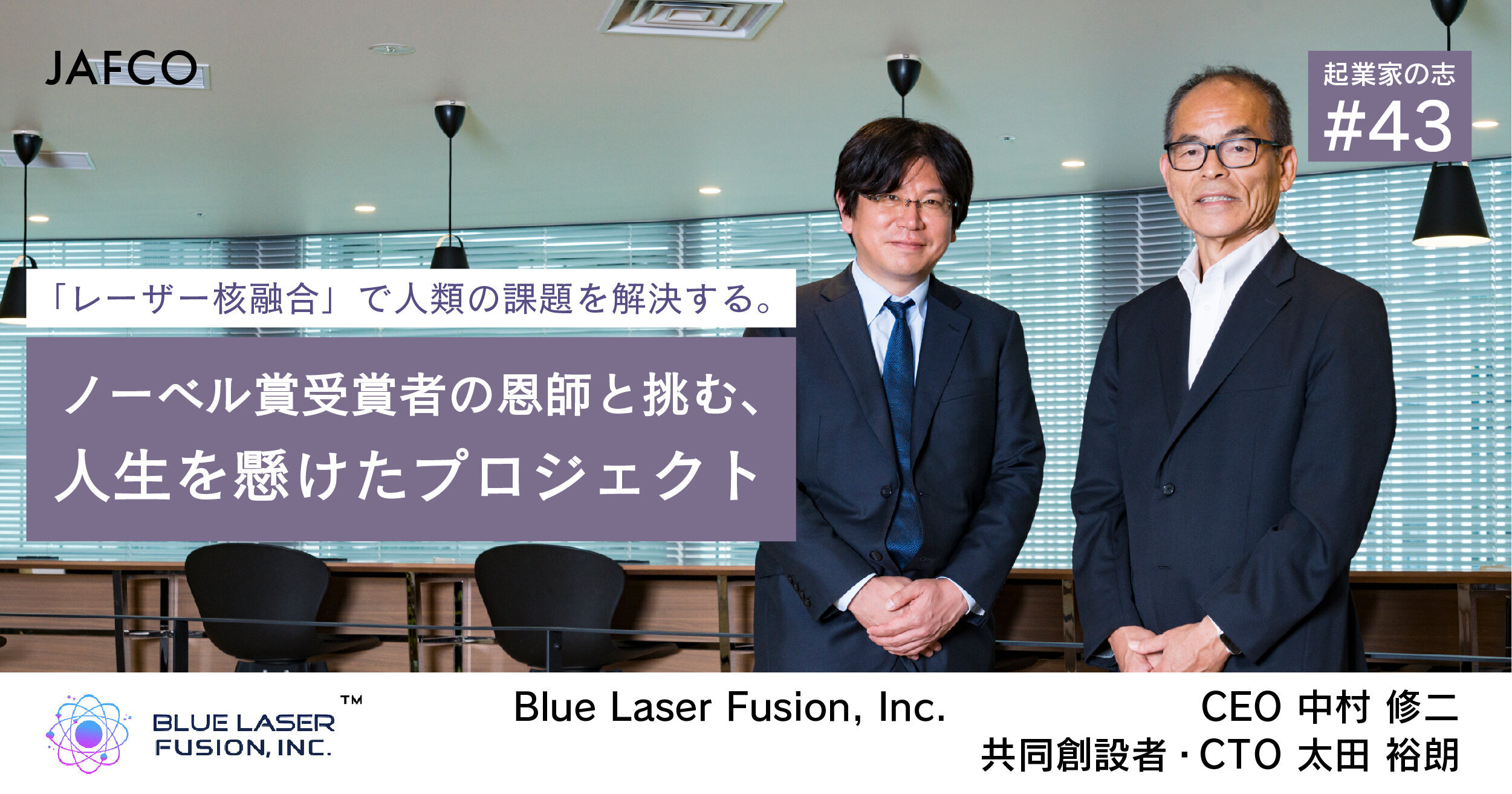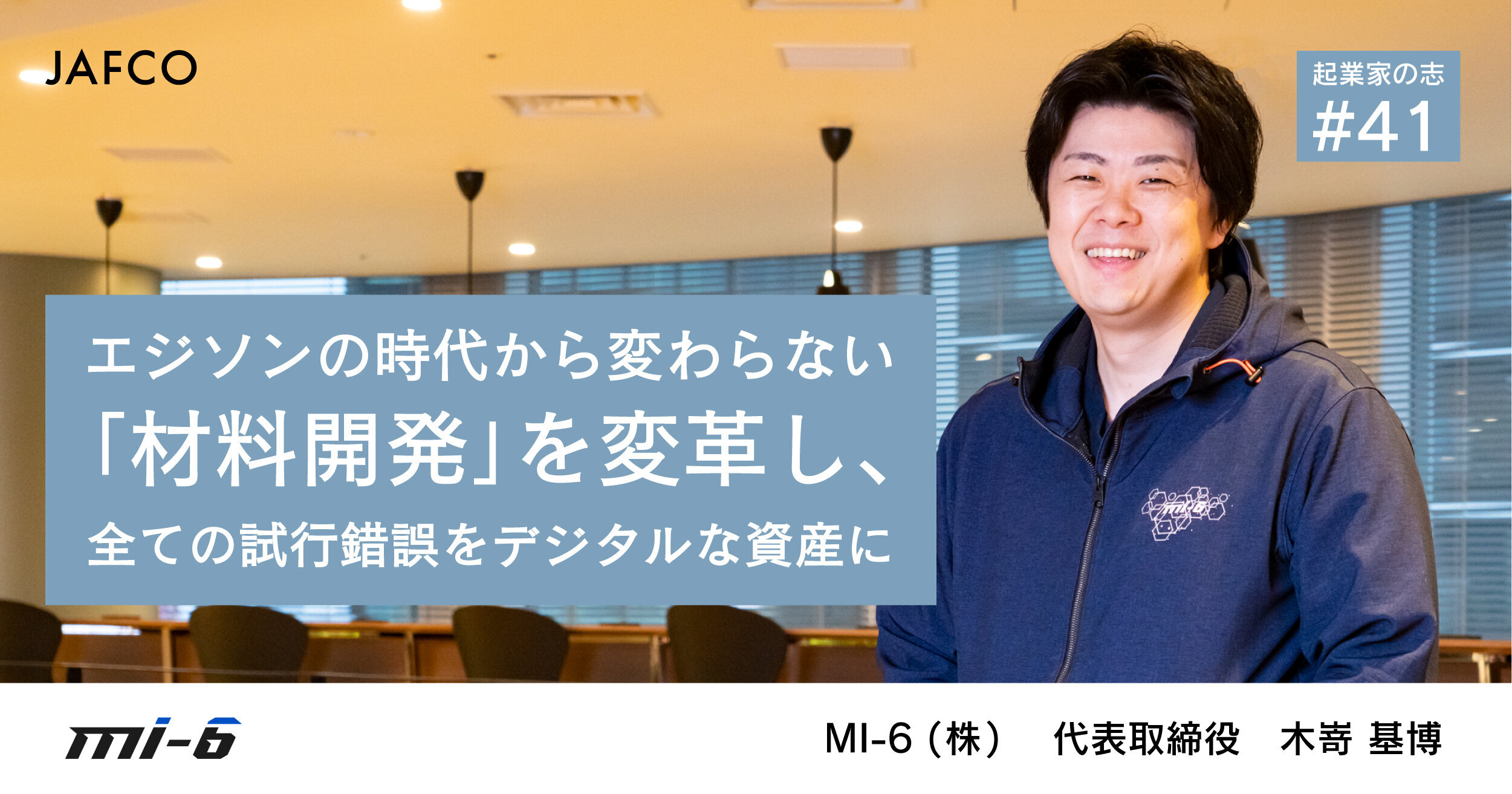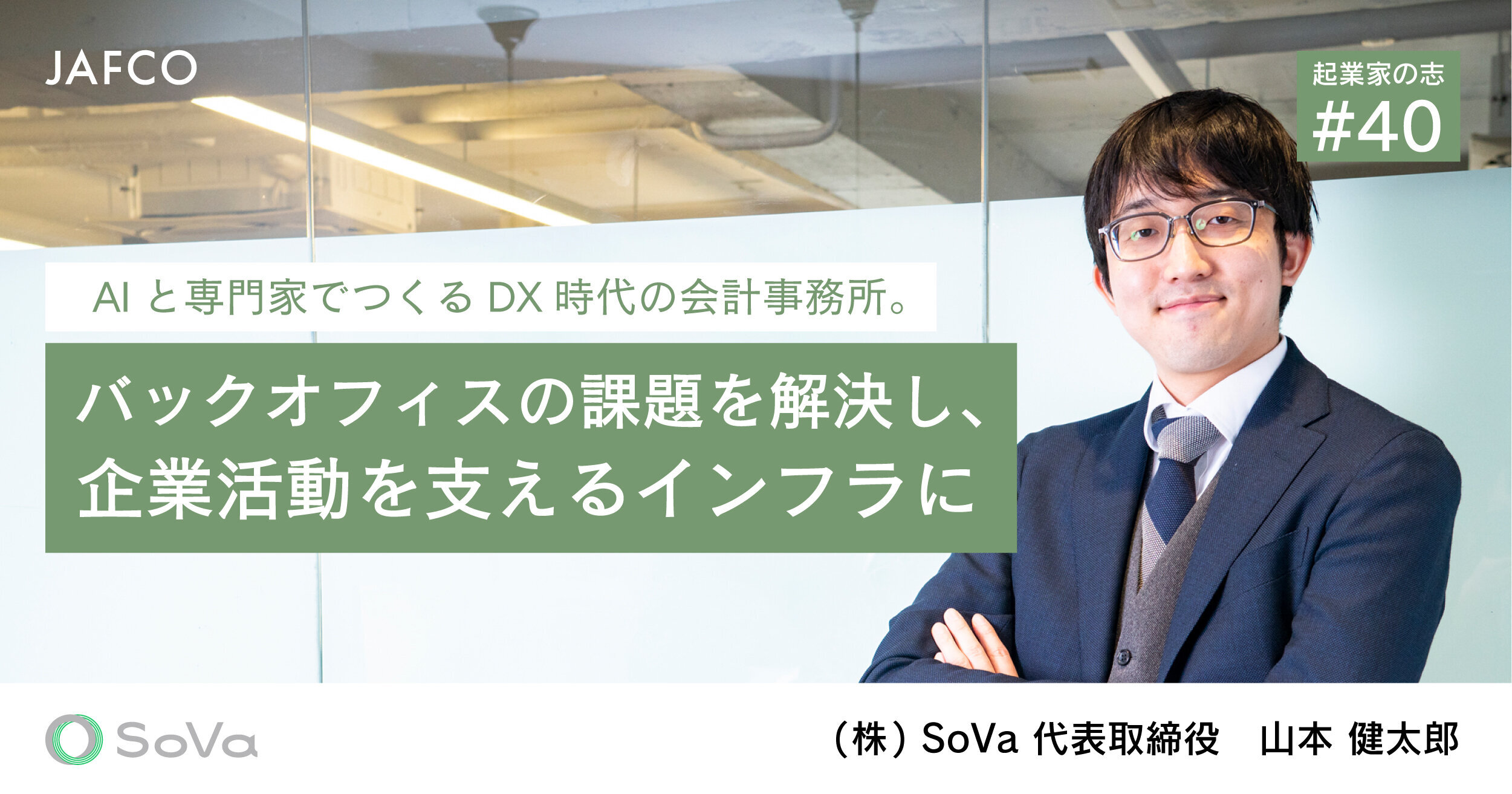"Entrepreneurial aspirations" to hear the background of deciding to start a business, the conflict until the business gets on track, and the desire to realize through the business. In the 15th meeting, we interviewed Mr. Ryuji Ikoma, President and CEO of Clear Inc.
【profile】
Clear Inc. President and CEO Ryuji Ikoma
After graduating from university, he became independent after two years of working experience. Founded Clear Inc. in 2013. With the vision of "creating the future of sake," we will develop a business specializing in sake.
[What's Clear Inc.]
Founded in 2013, the company develop a businesses specializing in sake with the mission of "challenging the possibilities of sake and opening up unknown markets. Since 2014, the company has been operating "SAKETIMES", Japan's largest web media dedicated to sake. Since 2018, the company has been operating the sake brand "SAKE HUNDRED", aiming to establish a luxury market for sake. The brand has won awards at global competitions and has been recognized by top chefs and sommeliers in Japan and abroad, and is developing a high-priced market that was said to be impossible in the industry. In May 2021, the company raised approximately 1.3 billion yen in total, with JAFCO Group serving as the lead investor, with the aim of strengthening SAKE HUNDRED's overseas operations.
I was addicted to the charm of sake. That's the starting point for everything
―What made you decide to start a business specializing in "sake"?
The reason is simple, and I was really fascinated by sake.
I started when I was 25 years old. It was an invitation from a friend in college. His parents' home was a sake brewery specializing in sake in Chiba prefecture. When taking over his family business, he said to me, who had experience in operating an EC site, that "EC is necessary to expand sake from now on."
Originally I couldn't drink much and didn't like sake so I refused, thinking "I can't sell what I don't like." Then he said, "I 'll bring a bottle of delicious sake, so if you think it's good, let's do it together." And I drank a sake called "Koro" from the Kumamoto Prefectural Sake Brewery Research Institute.
I was shocked by its deliciousness. After investigating, I found that the Kumamoto Prefectural Sake Brewery Research Institute produced a wonderful yeast called "No. 9 yeast" used by sake breweries nationwide. The sake itself was not well known, but it was a brewery that separated the legendary yeast. I was fascinated by the depth of sake and decided to start a business with sake.
-From what point did you think it could be commercialized?
The sake industry has the technology and knowledge that has been continuously used in traditional agricultural products, but little is known about it, and there are no new entrants. Sales have continued to decline because the Web has not been utilized and the development of the customer base has not progressed. However, if you convey the goodness properly, you can expect overseas demand. When I went to a sake brewery with a friend's helper and listened to the story, I was able to find out more and more charms, saying, "There is such added value!" I have come.
-Did you originally have a desire to become an entrepreneur?
Since I was a salaryman, I have been running an e-commerce site on my own, and I wanted to do my own business and test my strength. I quit the company I joined as a new graduate in a month and a half. That was a strong frustration experience for me. My friends around me are living a happy working life, but I don't have a business card that I can exchange with my friends. I was worried about whether I could do it as an organization, and I started to feel that I had to do my own business in the future. Fortunately, I came across delicious sake and found something that I was crazy about and wanted to know more about. In that case, I decided to put the feeling of "I want to do something with my own power" on this sake.
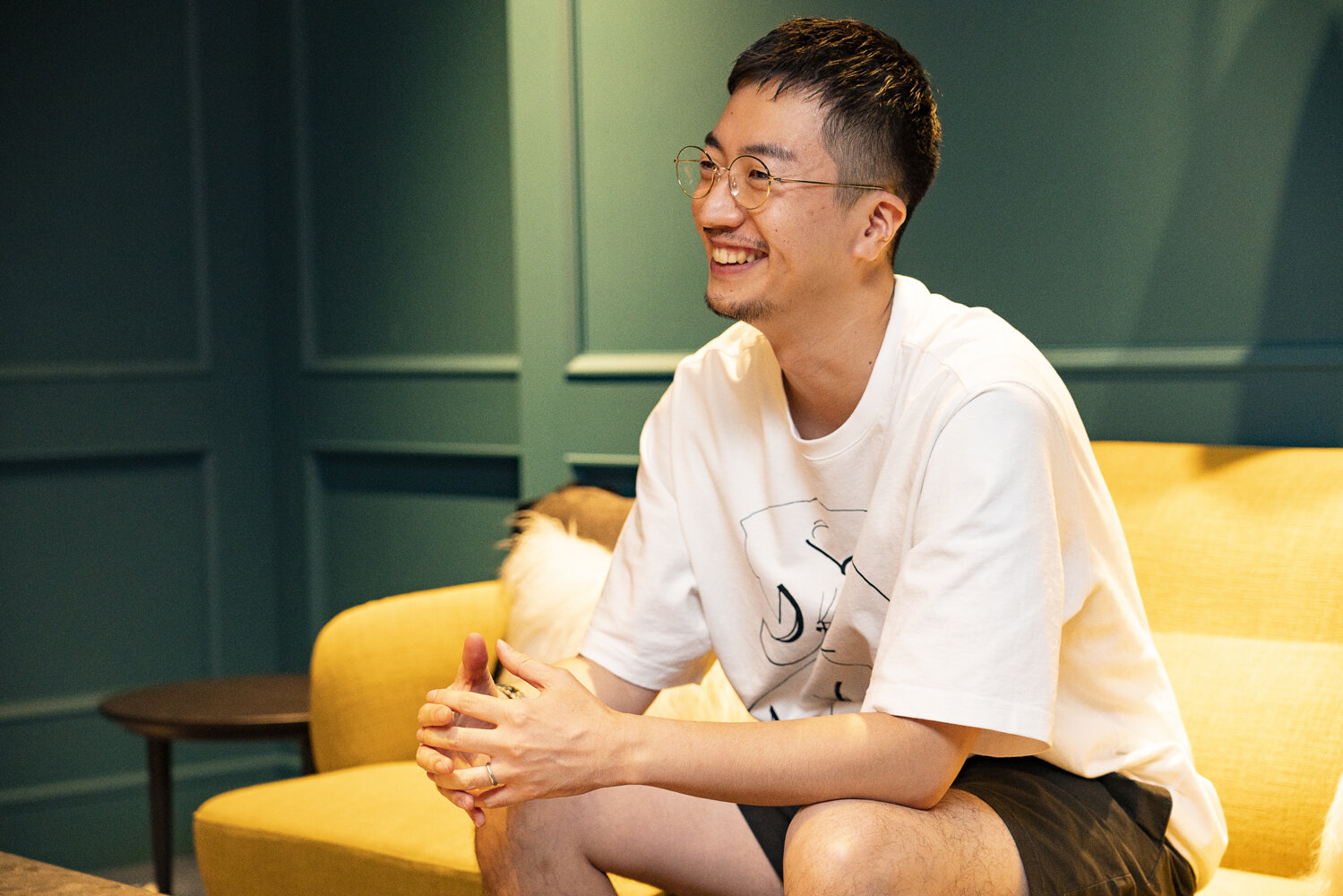
-Since 2014, you have been operating the sake-specialized web media "SAKETIMES", and since 2018, you have been operating the sake luxury brand "SAKE HUNDRED". How did you start your business after you were fascinated by sake?
It goes back to before the company was founded, but I met sake in 2011 and started a sake subscription business called SAKE LIFE in 2012. Although it was small in terms of sales, there was a response that people could connect with each other through delicious sake when the event was held. "After all, there is a need for sake," he founded Clear Inc. the following year. It was my successful experience to see the customers who picked up sake delighted that it was delicious. I launched "SAKETIMES" to try the sake business again using web media.
-What did you want to achieve with "SAKETIMES"?
After spending several years in the world of sake, I felt that the hurdles for gathering information were high.
Sake is available at convenience stores, liquor stores, and supermarkets. I have a product distribution, but I can't easily get to the information I want. Therefore, I decided to innovate in the distribution of information. Media management has a low initial cost, but it takes time to monetize. However, if certain conditions are met in terms of article quality, number of users, number of PVs, and engagement, companies will find the value to pay. I was confident that if I made good media, the results would follow.
Even though it's so delicious, the price is too low. Faced with neglected industry challenges
-How did you come up with the idea of "SAKE HUNDRED", which aims to develop a luxury market for sake?
It was great that I visited sake breweries nationwide and overseas to cover and shoot SAKETIMES.
The high level of sake brewing technology, the depth of the maker's feelings, the deliciousness, and the compatibility with cooking. The more I interviewed, the stronger my respect became, and I became more and more convinced of the possibilities. But at the same time, I saw a lot of issues. In a low-margin, high-selling business, there is no price range, so "good things are cheaper" will accelerate. There was a serious industry challenge that there were only cheap ones.
The production of sake has been declining since 1973, and three sake breweries are still closed every month. I couldn't forgive myself, who has a deep respect for sake, that "no one is drinking such a wonderful thing" and "the price is not paid properly". It's okay to have cheap products, but it's okay to have more expensive ones. By selling liquor, the desire to create a market directly grew.
-The luxury brand "SAKE HUNDRED" is steadily increasing the number of members.
The two scenery I saw overseas gave me the opportunity to open up new markets for sake. One was when I visited the US Gekkeikan in California, USA in 2016. Strong American employees were politely making sake, and Gekkeikan was completely indigenous as a local sake. The prejudice that the globalization of sake is still in the future has been broken. Second, when I went to Hong Kong in 2017, a bottle of sake was trading for 400,000 to 500,000. Although there were various indirect prices, I felt the future in the fact that there are people overseas who pay so much for sake. In addition to these responses, there was always the feeling that "I think I can go, so it's okay."
I value the belief that "what I believe in is more important than anything else". Of course, since I am a business owner, I see market information. However, it is not the actualization of the market or who supports it, but "I am thinking about sake, studying, visiting sake breweries, drinking and experiencing it" is the best collateral. ..
-How was the response from the industry?
Many people agreed with the need for a high-priced market because of the relationships we have built with SAKETIMES.
Sake breweries, who actually work with SAKE HUNDRED, said, "Since I worked with Mr. Ikoma, I've become proud that sake is amazing." I'm always pushed by the expectations I receive. Nowadays, famous sake breweries from all over the country contact us, "Why don't you do it together?" Since we have a policy of going with a small number of elite lineups, we often refuse, but we are tightened by the fact that the brand is such that we can receive offers.
Affirm and give quick advice. The relationship of trust with JAFCO is pushing my back
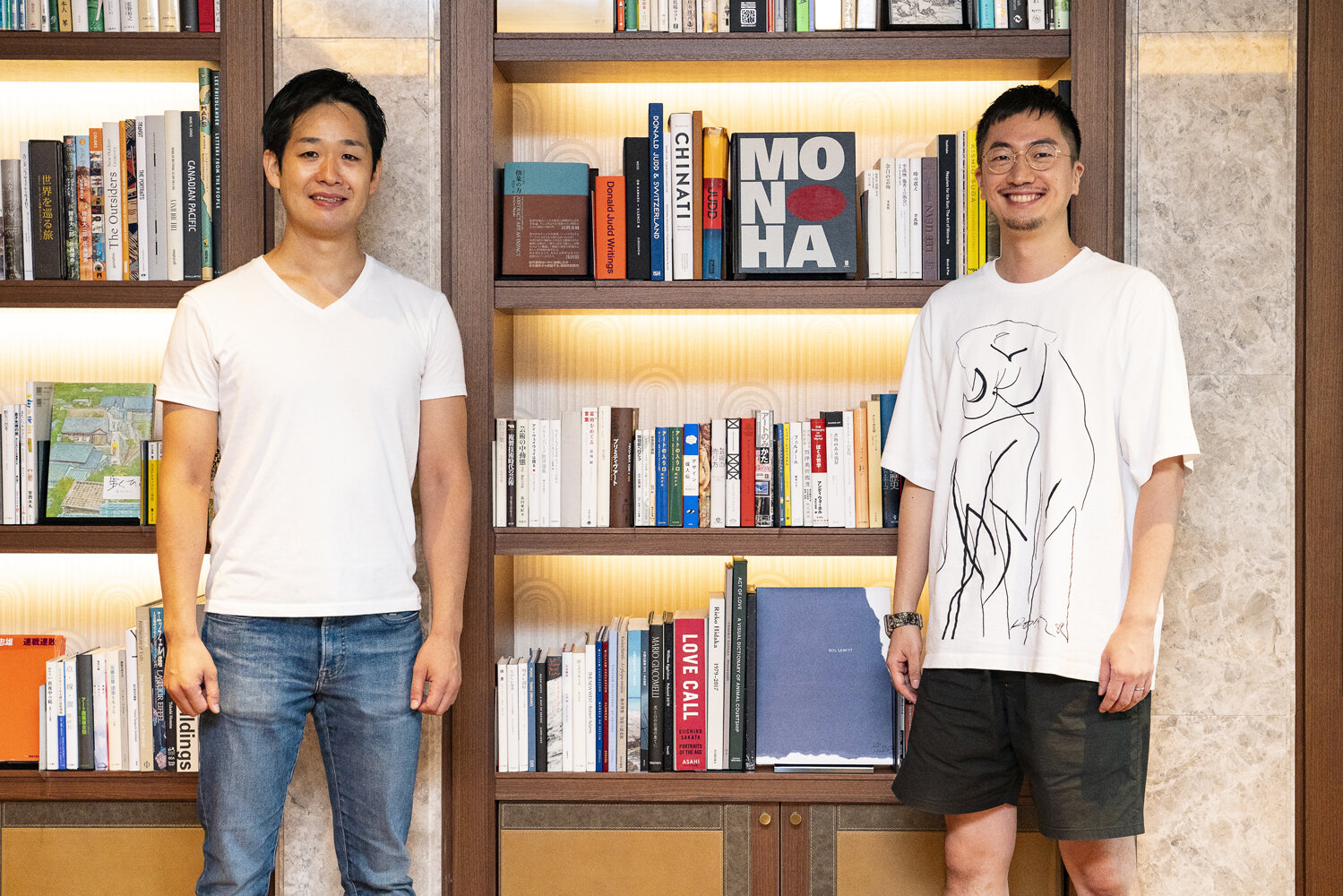
Mr. Ikoma and Yoshikazu Akagawa, the capitalist in charge of JAFCO (left)
-In May 2021, JAFCO raised approximately 1.3 billion yen as a lead investor. What was the reason for choosing JAFCO?
One is that the way the capitalist in charge, Mr. Akagawa, interacted with me was comfortable. He refreshingly affirms that it is a good business, and also responds to issues such as "that is something we should think about from now on." The story went on and on, and I thought he was a comfortable person. Strategically speaking, I thought that boosting the big sign called JAFCO was significant for the IPO.
Until then, I was often told that I would invest in the attractiveness of human beings called Ikoma. On the other hand, I was happy, but there was also the regret that I wanted you to see the business! Though we're a very obscure startup, I thought by getting an investment from JAFCO, who have a long history, we would be able to gain social recognition for our business itself.
-What kind of potential did JAFCO find in Clear?
In the process of due diligence, Mr. Akagawa, who is in charge, once went to a local sake brewery. At that time, Mr. Akagawa said, "We are promoting the business while understanding the feelings of sake breweries, which has been going on for generations." After that, he said that he felt a long-term vision as a company and a brand. Going to a sake brewery may have been one turning point.
I think the other is a member. Depending on the stage of growth, the necessary people came in properly and the number of friends increased. There is a feeling that the company has been steadily strengthened by hiring. Mr. Akagawa also evaluated that "human resources with clear skill sets and excellent members are participating one after another."
-Human resources acquisition is a major challenge for many startups. What are the factors behind the success of hiring and what have been devised?
In hiring, we are looking at three points: skill fit, culture fit, and mindset, based on the basic premise that you are interested in the sake business. Whether or not he is a person who has work experience and achievements, is motivated to grow, finds issues while humbly introspecting, but can move boldly. Clear has a lot of good people who are calm, so I often see the matching with the peaceful atmosphere. It is unfortunate for the hiring party to enter a culture that does not suit them. It is important to verbalize the culture so that both individuals and businesses can clearly choose whether they fit or not.
-Did you have any concrete efforts to form a culture since you started your business?
I agree. We have involved members in the decision-making process and have been verbalizing "what is Clear" since we had five employees. By thinking about the vision, mission, and values together, all the members will be personalized and will be convinced of the decided contents.
Business needs "people, money, things", but money and things don't add any more value. But humans have a variable called motivation. Even a person with 100 skills can only demonstrate 20 if he has only 20 motivations. Only humans have the characteristic that performance is not stable without daily care.
That is why companies are required to take measures to maintain motivation and enjoyment that affect performance. I think this is the basic idea of why "people" are important and why culture is necessary.
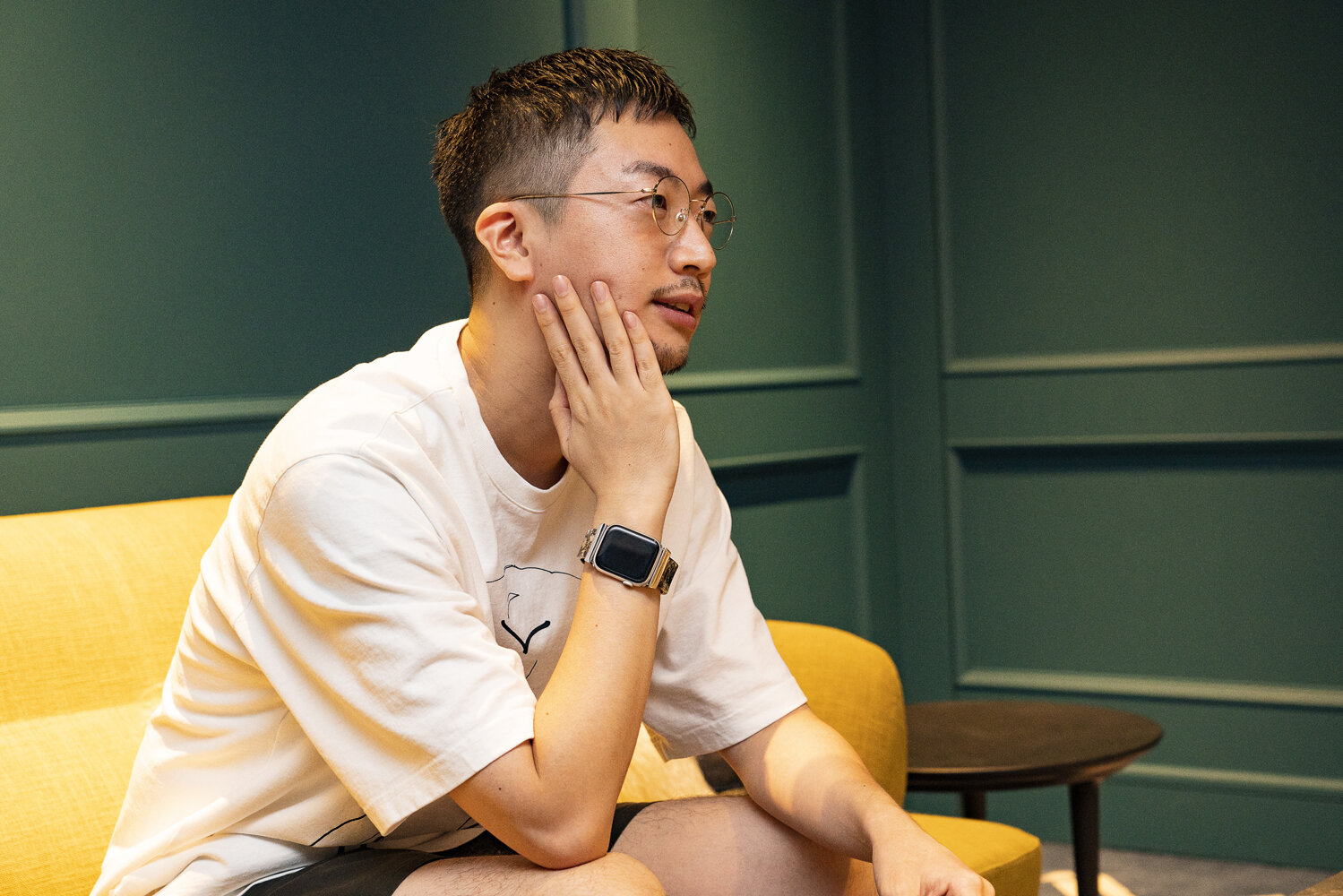
-What kind of interaction do you have with JAFCO now that you have received the investment?
Since you invested a large amount of money, I was prepared for some interference. However, I am able to relax more than I expected.
There are many challenges, but we always feel that we are inadequate, and we continue to show them to JAFCO. I think that showing in action that "I understand the issues, face them, and make efforts to grow the business" will lead to a relationship of trust.
Mr. Akagawa respects that I am the most thoughtful about the business. It may be easier to do because you have seen many startups. When you talk about a problem, they pop up ideas for solutions, and they quickly affirm your decision and encourage you to take action. It doesn't pull or push, it's an image that casually puts your hand on your back.
The world is made up of "will". It 's important that you have enough to believe
-Please tell us what you want to achieve in the future.
First of all, I would like you to know more about the charm of Japan, the birthplace of sake. On top of that, I would like to focus on overseas strategies. Since the market size is completely different overseas, expanding overseas is indispensable for realizing the vision of "creating the future of sake." However, I don't want to reimport what the Japanese haven't evaluated after expanding it overseas. I'm proud of it in Japan, so I think I can buy it with confidence, so I'm particular about the order of "first in Japan."
Delicious food is universal, so I am confident that the value will be conveyed if people from overseas drink it. There are many physical hurdles such as differences in business customs and delivery time lag, so the current issue is how to resolve them.
-As an entrepreneur, do you have any things or beliefs that you have consistently cherished?
I believe that the world is made of will.
One person's will to do this in the world and to make something like this is the beginning of everything, and the world changes as the swell grows. I think that the world today is a collection of wills.
Whenever I try to start something new, there are always people who say, "I can't do that" or "I can't." I was often told, but I was always wondering, "Why can I say this even though I have never done it?" I'm acting with my head more than anyone else, so I don't think I need to be influenced by the opinions of others. As an entrepreneur with a large amount of money, you can't afford to fail, but it's more important to have a will at the end than numbers and information. Do you think you can do it rather than whether you can or cannot? I have a strong feeling that it is okay if I decide and continue.
-Do you have any message or advice for those who want to become an entrepreneur?
Just because you believe it doesn't mean it will work. But if you don't believe it and do it, it won't work. I want you to believe in your feelings, and I think it is forever necessary to make an effort to stay on your own. I want you to keep thinking, worrying, finishing, and having fun.
